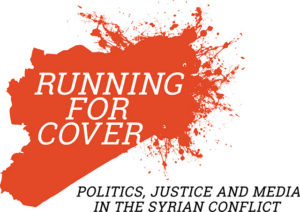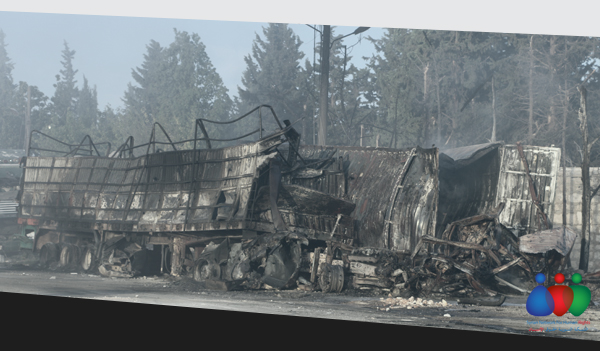|
||||||||||||||||||||||||||||||||
|
||||||||||||||||||||||||||||||||
|
Syria Watch
VDC: Who kills the civilians in Syria?

Institute for National Security and Counterterrorism: Running for Cover: Syrian Conflict Will Be the Subject of Media, Law, & Politics Dialog
Running for Cover: Syrian Conflict Will Be the Subject of Media, Law, & Politics Dialog
 Accountability in the Syrian conflict will be the focus of a daylong event hosted by the Newhouse Center for Global Engagement in Syracuse University’s S.I. Newhouse School of Public Communications next month. “Running for Cover: Politics, Justice and Media in the Syrian Conflict” will take place Oct. 6, 2016, beginning at 9 a.m. in the Joyce Hergenhan Auditorium, Newhouse 3. The event will be streamed live at http://newhouseglobal.syr.edu. Follow on Twitter at #SUSyria.
Accountability in the Syrian conflict will be the focus of a daylong event hosted by the Newhouse Center for Global Engagement in Syracuse University’s S.I. Newhouse School of Public Communications next month. “Running for Cover: Politics, Justice and Media in the Syrian Conflict” will take place Oct. 6, 2016, beginning at 9 a.m. in the Joyce Hergenhan Auditorium, Newhouse 3. The event will be streamed live at http://newhouseglobal.syr.edu. Follow on Twitter at #SUSyria.
The event will analyze the international community’s response to the Syrian conflict and its effects, as well as the challenges to reporting the war, developing political solutions, and seeking justice for victims. The interactive event is designed as a “fishbowl” conversation among academics, policymakers, human rights advocates, journalists, and the audience. Participants will explore how the international community captures news and images from the conflict, investigates alleged war crimes and human rights violations, and protects refugees. They also will discuss lessons learned from this conflict that might inform the response to future conflicts.
“Our aim is to critique the failures of the international response to the Syrian conflict and introduce ways in which we can collectively achieve positive change,” says Ken Harper, director of the Newhouse Center for Global Engagement and chief organizer of the event. “We are crafting the event to be less of a ‘sage on the stage’ and more of a ‘guide on the side’ experience. We hope it’s a useful event that speaks to the seriousness of the situation and honors those suffering with an honest conversation.”
A series of five panel discussions will cover a range of topics. An empty chair will allow audience members to join and rotate through each panel. Syrian activists on the ground and around the world will be invited to participate anonymously via social media.
Schedule
Opening Remarks
Newhouse Dean Lorraine Branham and Ken Harper
The Geopolitical Situation in Syria
Panelists will address the historical context of the conflict and offer a critique of the political, military, and humanitarian responses of the international community, including an assessment of where we stand now.
Facilitator: Sherine Tadros, Representative and Head of New York (UN) Office, Amnesty International.
Panelists: Lamis Abdelaaty, Assistant Professor of Political Science, Maxwell School; Bassam al-Ahmad, Executive Director, Syrians for Truth and Justice; Consultant, International Federation for Human Rights; and former Spokesperson, Violations Documentation Center in Syria; William Banks, Founding Director, Institute for National Security and Counterterrorism, Syracuse University; and Mehrzad Boroujerdi, Chair of Political Science, Maxwell School.
Accountability for Atrocity
This panel will explore the various justice options available to the people of Syria and the surrounding region who are victims of the atrocities committed during the Syrian conflict, and the likelihood of those options being utilized by the international community.
Facilitator: David Crane, Founding Director, Syrian Accountability Project, SU College of Law.
Panelists: Bill Wiley, Head of Operations, Commission for International Justice and Accountability and Radwan Ziadeh, senior analyst, Arab Center Washington DC, and founder and director, Damascus Center for Human Rights Studies.
The Media’s Role
A once well-funded international press corps has been depleted to the point where accurate reporting on one of the most complex conflicts of the 21st century is almost impossible. This panel will look at how the conflict has been reported and how reportage can be improved.
Facilitator: Hub Brown, Associate Dean for Research, Creativity, International Initiatives, and Diversity, Newhouse School.
Panelists: Roy Gutman, former Foreign Editor, McClatchy and Newsday; Ned Parker, Enterprise Reporter, Reuters; Reza, Photojournalist, National Geographic, and Founder, Reza Visual Academy; and Ben Taub, Contributing Writer, newyorker.com.
Social Media in Reporting War
Social media has forever changed the way we report on and bear witness to conflict and atrocities. This panel will explore the intersection of social justice and oppression. Is social media aiding transparency and accountability in Syria or is it a tool of oppression?
Facilitator: Jennifer Grygiel, Assistant Professor of Communications, Newhouse School.
Panelists: Ammar Abdulhamid, President, Tharwa Foundation; Andrew Beiter, Education Director, I Am Syria; and Fadi Hussein, Co-Founder, Instant Reporting Team.
Next Steps
Now what? This panel will discuss current and new initiatives from NGOs, media, governments, and the academic community that address the complex challenges of the Syrian conflict and outline action items for moving forward.
Facilitator: Ken Harper
Panelists: Beiter; Gutman; Wiley; and Elijah Shama, Founder, Reporters Without Borders SU Chapter.
Closing Remarks
David Crane
PLUS … An exhibit featuring photos of those directly affected by the Syrian conflict will be on display inside and at the entrance to the Joyce Hergenhan Auditorium. Images are provided by Pictures of the Year International and Ed Kashi of VII Photo Agency and Talking Eyes, as well as from the special gallery “Exile Voices,” which comprises images taken by children at Kawergosk Refugee Camp in northern Iraq as part of the Reza Visual Academy.
For more information, visit http://newhouseglobal.syr.edu/event/syria.
The conference is co-sponsored by the International Relations and Middle Eastern Studies programs in the Maxwell School of Citizenship and Public Affairs and the Institute for National Security and Counterterrorism Carol Becker Middle East Security Speaker Series. Additional support comes from Impunity Watch and the Syrian Accountability Project (SU College of Law) and the Alexia Foundation.
![]()
Syrian Network for Human Rights: Multiple Evidences Indicating that Russian and Syrian Forces Deliberately Targeted the U.N. Aid Convoy in Aleppo
|
Syria Justice and Accountability Centre: Inclusivity framework vital to achieving transitional justice in Syria
|
|||||||||||||||||||||
|
|||||||||||||||||||||
|
|||||||||||||||||||||
|






